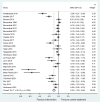The Effects of Aerobic and Resistance Exercise on Depression and Anxiety: Systematic Review With Meta-Analysis
- PMID: 40432290
- PMCID: PMC12117297
- DOI: 10.1111/inm.70054
The Effects of Aerobic and Resistance Exercise on Depression and Anxiety: Systematic Review With Meta-Analysis
Abstract
Exercise can reduce physiological and psychological symptoms associated with depression and anxiety. However, it is unknown which mode of exercise, if any, is more beneficial. To determine whether aerobic, resistance, or aerobic and resistance exercise improves depressive and/or anxiety symptoms in individuals diagnosed with depression or anxiety. Preferred Reporting Items for Systematic Reviews and Meta-Analyses (PRISMA) guidelines were followed. Five electronic databases were searched, until February 24, 2024. Studies were included for analysis based on satisfying quality appraisal standards and the established inclusion criteria associated with aerobic or resistance exercise in adults with a diagnosis of depression or anxiety. Random effects meta-analysis was performed where possible. Thirty-two randomised controlled trial studies (n = 3243 participants) met the inclusion criteria for this systematic review, and 26 studies (n = 2681 participants) were included in the meta-analyses. For the 25 studies assessing the effect of exercise on depressive symptoms, the pooled standardised mean difference (SMD) favoured exercise as a beneficial treatment of depression (-0.97, 95% confidence interval [CI] -1.28 to -0.66), with a large magnitude of effect. For the 11 studies reporting the effect of exercise on anxiety symptoms, the pooled SMD results revealed that exercise had a significant, moderate magnitude of effect favouring exercise treatment (-0.66, 95% CI -1.09 to -0.23). No studies excessively influenced the outcomes of depression and anxiety. Aerobic, resistance, or a mixture of aerobic and resistance exercise is beneficial for improving symptoms of depression and anxiety. Protocol Registration: PROSPERO registration number: CRD42019119341 (date of registration: 5/2/2019).
Keywords: mental health; mental illness; mental well‐being; physical activity.
© 2025 The Author(s). International Journal of Mental Health Nursing published by John Wiley & Sons Australia, Ltd.
Conflict of interest statement
The authors declare no conflicts of interest.
Figures








References
-
- Abdollahi, A. , LeBouthillier D. M., Najafi M., et al. 2017. “Effect of Exercise Augmentation of Cognitive Behavioural Therapy for the Treatment of Suicidal Ideation and Depression.” Journal of Affective Disorders 219: 58–63. - PubMed
-
- Abt, G. , Boreham C., Davison G., et al. 2020. “Power, Precision, and Sample Size Estimation in Sport and Exercise Science Research.” Journal of Sports Sciences 38, no. 17: 1933–1935. - PubMed
-
- American Psychiatric Association . 2018. Diagnostic and Statistical Manual of Mental Disorders. 5th ed. APA. 10.1176/appi.books.9780890425596. - DOI
Publication types
MeSH terms
LinkOut - more resources
Full Text Sources
Medical
Miscellaneous

